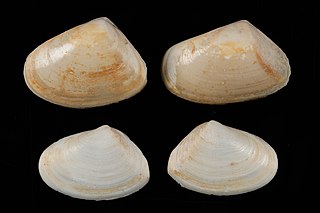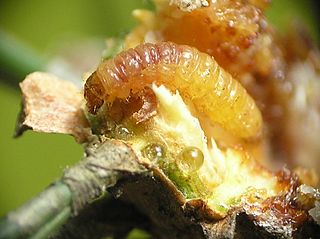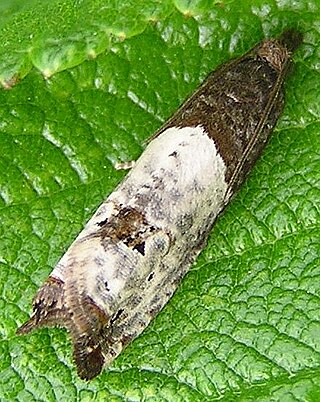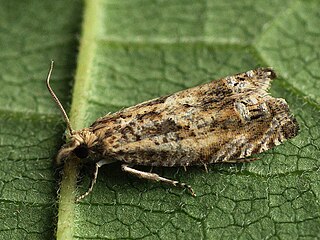Related Research Articles

Paphies subtriangulata is a species of edible bivalve clam known as tuatua in the Māori language, a member of the family Mesodesmatidae and endemic to New Zealand. It is found on all three of the main New Zealand islands, buried in fine clean sand on ocean beaches.

Paphies is a genus of large, edible, saltwater clams, marine bivalve molluscs in the family Mesodesmatidae. The genus is endemic to New Zealand. The species in this genus include the pipi, tuatua and toheroa.

The Archipini are a tribe of tortrix moths. Since many genera of these are not yet assigned to tribes, the genus list presented here is provisional.

Zeiraphera isertana is a moth of the family Tortricidae. It is found in China, Russia, Europe and the Near East.

Eupoecilia ambiguella, the vine moth, is a moth of the family Tortricidae. It is found in Europe, China, India, Japan, Korea, Mongolia and the Russian Far East.

Choristoneura murinana is a moth of the family Tortricidae. It is found in central Europe and the Near East, China, Taiwan and in North America.
Scotiophyes is a genus of moths belonging to the subfamily Tortricinae of the family Tortricidae.

Retinia resinella, the pine resin-gall moth, is a moth of the family Tortricidae.

Notocelia roborana is a moth of the family Tortricidae. It is found from Europe to eastern Russia. It is also found in Asia Minor, Iran, Mongolia and China (Xinjiang).

Epinotia brunnichana is a moth of the family Tortricidae. It is found in most western, central and northern Europe, the Near East and further east to the eastern Palearctic realm, where it has been recorded from Russia, Kazakhstan, China, and Japan.

Acleris ferrugana is a species of moth of the family Tortricidae. It is found in China, most of Europe and has also been recorded from North America.

Falseuncaria ruficiliana, the red-fringed conch, is a species of moth of the family Tortricidae. It is found in China (Xinjiang) and most of Europe. The habitat consists of limestone, heathland and moorland.

Phalonidia curvistrigana, the golden-rod conch, is a species of moth of the family Tortricidae. It is found in China, Japan, Korea, Russia and most of Europe. The habitat consists of woodland and scrubland.

Epiblema graphana is a species of moth of the family Tortricidae. It is found in Spain, France, Germany, the Benelux, Denmark, Austria, Switzerland, Italy, the Czech Republic, Slovakia, Poland, Norway, Sweden, Finland, the Baltic region, Albania, Romania, Bulgaria, Hungary, Slovenia, North Macedonia, Greece, the Near East, Russia, Kazakhstan, Iran, Afghanistan and China.

Eucosma aemulana, the obscure bell, is a species of moth of the family Tortricidae. It is found in China, Korea, Russia and most of Europe. It is also found in the United States, where it has been recorded from Colorado, New Mexico, Oklahoma and Utah. The habitat consists of woodlands, chalk downland and cliffs.

Notocelia tetragonana, the square-spot bell, is a species of moth of the family Tortricidae. It is found in China, Russia and Europe, where it has been recorded from most of the continent, except the Iberian Peninsula, the Netherlands, Denmark and most of the Balkan Peninsula. The habitat consists of woodland and scrubland.

Ptycholomoides aeriferana, the larch twist, is a species of moth of the family Tortricidae. It is found in China (Heilongjiang), the Korean Peninsula, Japan, Russia and most of Europe.
Scotiophyes hemiptycha is a species of moth of the family Tortricidae. It is found on Sumatra in Indonesia.
Scotiophyes nebrias is a species of moth of the family Tortricidae. It is found in Brunei on the island of Borneo.

Acleris fimbriana, the yellow tortrix moth, is a species of moth of the family Tortricidae. It is found in France, Germany, Denmark, Italy, Slovakia, Hungary, Romania, Poland, Norway, Sweden, Finland, the Baltic region, Ukraine and Russia. It is also found in China and South Korea.
References
- ↑ tortricidae.com
- ↑ "Taxonomic study on Scotiophyes Diakonoff from China, with the description of a new species (Lepidoptera: Tortricidae)" (PDF). Zootaxa . January 9, 2009 – via Mapress.